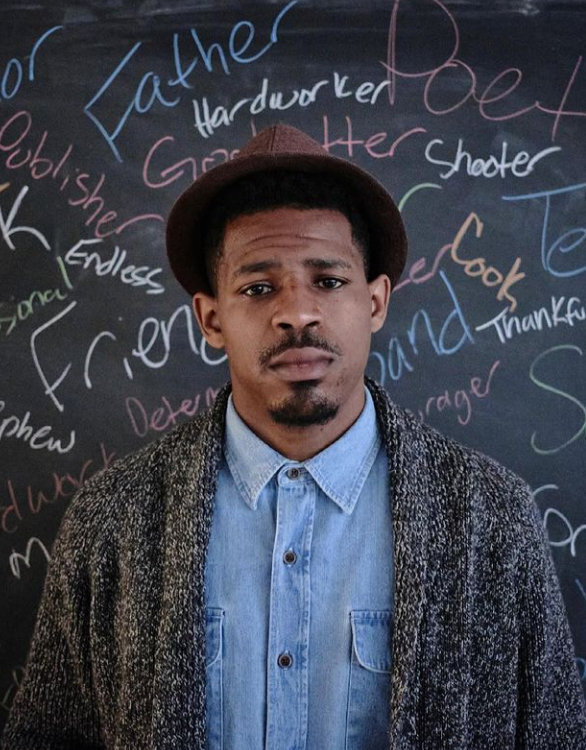A Natural Addition
Poet Laureate William Davis Brings Spoken Word to Emerson Waldorf School
Photo by Green Rabbit Photography
Self-expression. Self-confidence. Vulnerability. Empowerment. For a 15-year-old high school student, these are precious—and often hard to come by—qualities.
Enter William Davis, former Hillsborough Poet Laureate (2016-18) and current teacher of spoken word. Blessed with a rare blend of youthful vigor and calm self-assurance, he seems the perfect person to stand in front of today’s youth and awaken their inner muses.
***
One of the first things William Davis did when we met was compliment my flannel shirt and blue jeans. I hadn’t put much thought into the outfit (indeed, I was unaccustomed to this form of flattery), but it felt nice to be recognized. Empowering, even. Later, when pleasantries were long aside, I asked him to describe a slam poetry event. He told me about his first performance—how when it came time for him to share, he walked through the audience toward the stage and was met with a chorus of, “Nice boots, cowboy!” and “Ooo, I see you in that hat!” and “You rockin’ that hoodie!” It was unexpected, but William quickly learned that this was a staple of slam poetry events.
“It’s like being heckled,” William told me with a smile, “only it’s friendly. Friendly heckles. They’re trying to give you confidence; they’re trying to lift you up.”
Now, Mr. Davis wants to lift up Emerson’s high school students by giving them a stage on which to stand and a space in which to share. Spoken word is still a relatively young form of art—indeed, the first recorded poetry slam occurred in 1986 in a Chicago jazz club—and since its inception, has functioned predominantly as an outlet for youth to share issues of identity, belonging, prejudice, gender, social justice, and race. “Every child wants to be heard,” William explained. “Art is about being heard—it’s self-expression. A painting, a song, a sculpture, a poem, it’s all self-expression. When I teach, the most exciting part for me is hearing what these young adults have to say.”
“What about shy students?” I asked, thinking of my penchant for avoiding the spotlight. “You must have some kids who don’t want to share at all.”
“Those kids have the most to say,” he quipped, eyes twinkling.
William Davis gets it. He gets what it’s like to be a kid. He also gets Waldorf.
Despite having spent less than a year on Emerson’s campus teaching 8th-12th grade, he can already sense the magic that takes place here. He marveled at the close connections between students, some of whom have been friends and classmates since kindergarten. On the subject of spoken word, William insisted that Emerson students take to poetry quicker than anywhere else he’s taught—likely, he supposes, a reflection of the art-infused curriculum to which they are exposed from an early age. William sees spoken word as a natural addition to Emerson’s curriculum, and to drive this point home, he compared poetry with theatre:
“An actor in a play works within the confines of a script. It takes great courage to act, but you’re a character, not yourself. On the other hand,” and here he literally gestured with his right hand, “take spoken word. There is nothing more vulnerable than reading—performing—something you wrote from scratch. That’s personal. That’s baring your soul.”
William starts every course he teaches by sharing one of his poems. It’s a personal story about a troubled and tumultuous childhood. He reads it to demonstrate vulnerability and lead by example. “If I don’t bare my soul, why should they?” he asked rhetorically.
As a kid, William’s tough home life spilled over into the classroom, where he was a difficult student and the source of more than a few teacher headaches. “I had attitude,” he told me simply. But that all changed when his 11th grade English teacher pulled him aside. She called him out on his poor behavior while at the same time recognizing his potential as a writer. That shifted something inside William and helped propel him to where he is today. By sharing that personal poem at the start of his course, William is certainly inviting his students to write themselves—their honest, vulnerable selves—into their work, but perhaps, as he sets forth on a journey with his students, he is also acknowledging his beginnings as a poet.
Maybe William can be for some lucky student what his old high school English teacher was for him: a mentor, a catalyst, and an inspiration. Even if his students don’t grow up to be poet laureates, they can leave his class as published authors. William and his wife run Writers Block LLC, a publishing company, and as a gift to his students, they offer complimentary bookmaking and publishing. “I’m very proud of this,” William told me, “but not nearly as proud as the kids are when they get to hold their very own book in their hands.”
“Mr. Davis’s classes are always fun and engaging,” one of his students told me. “He is invested in us growing in confidence through poetry, public speaking, and learning about ourselves, all in a supportive and inclusive environment.”
Indeed, one can imagine the shot of confidence that accompanies any performance—be it song, speech, or story. But delivering your truth to the wider community, alone on stage, to the reception of snaps and friendly heckles, is a uniquely powerful experience. Spoken word gives that to students—and more. For some, it is an act of reclamation, as poets take back past traumas and mold them into beautiful works of art. And by asking its practitioners to look inward for inspiration, spoken word shepherds students away from pop culture and celebrities and toward a more organic well-spring from which to build their identity.
While the performers gain confidence and practice introspection, the audience benefits from active, respectful listening—an oft-overlooked, immensely useful skill. Professional spoken word poet Sierra DeMulder writes that “Performance poetry allows not only the opportunity to articulate [marginalized narratives], but also provides space for others to hear and better understand them without disrespectfully demanding information.”
How critical, then, to teach spoken word to today’s youth. The Emerson Waldorf School is lucky to have such an accomplished, dynamic, and thoughtful teacher at the helm; like spoken word, William Davis is a natural addition to the school.
Kaylen Alexis, Class of 2015
***
Here’s the poem Willam Davis shares with his students on the first day of class:
My Dad Gave Up
My dad gave up
I've seen pictures and heard stories
About when he was ambitious
And had goals and actually tried
But somewhere in his life, that part of him died
And I have memories that I hold dear to my heart
About when he would take me to work with him
Teaching me to hold a hammer
And saying, "son hit that nail"
And looking me in the eye and saying son try your hardest at what you want I guarantee you will not fail and never give up your fight
But as I converse with him now days
I want to ask why he didn't take his own advice
And it is not right to see a man let alone your dad
So sad
Waking up every day so mad
A man filled with such anger
I look at him as a stranger
A man I don't want to meet
Because I am his Junior and I refuse for that to be me
My dad gave up
A man with six kids six baby mamas
3 girls 3 boys
2 failed marriages
So many empty voids
At one time he was my hero my leader
And there are times today when I want to tell you
Dad, I need you
But yet I avoid moments when I can see you
And we resemble each other slightly
So I'm afraid that one day I'll be you
Like a broken reflection
Looking at you is seeing all the dreams I've neglected
There are times when I want to ask you why have you accepted
This life
Of complacency
Of wait and see
Of merely nothing
My dad gave up
And I am his oldest child
By saying that I'm not saying that I'm affected the most
But I'm the one that must smile
When my siblings come to me with the weight of our father
I have to hide my emotions and show that I'm not bothered
And give those words of encouragement
Make silly jokes
And love
Until their worries have went
My dad gave up
And I am a man with kids
Three boys and two precious girls
I couldn't imagine a day without trying to make them better
Because they are my world
My air
And I refuse to give them an opportunity
To utter the words that my dad was not there
Because I am aware of the feelings that can begin to grow when you know that
Your dad doesn't care
About himself
Let alone anyone else
So I tie shoes
And watch blues clues
And kiss boo-boos
And I enjoy it
Because to me
Being a dad is great stuff
And I promise myself and my children that they will never say
My dad gave up
- William Davis



